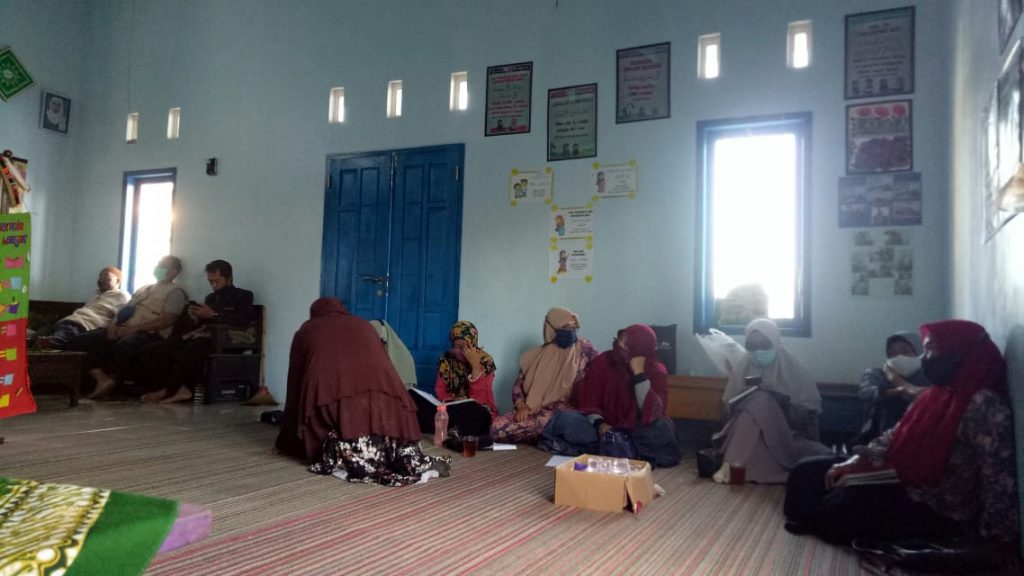
The Department of Food and Agricultural Products Technology of FTP UGM held a community service activity themed “Technical Guidance and Alternative Carica Processing Technology” for the Management of the Elderly Cottage and Al-Maa’uun Orphanage, Wonosobo. This activity was guided by Dr. Arima Diah Setiowati, S.T.P., M.Sc., TPHP UGM lecturer. The activity which took place at 09.00-12.30 WIB was carried out through the Zoom Meeting platform.
The event was opened with remarks from Prof. Dr. Ir. Tyas Utami, M.Sc. as Chairperson of the UGM TPHP Department and Mr. Sukarwi as a representative of the elderly cottage and Al-Maa’uun orphanage, Wonosobo. Mr. Sukarwi said that the obstacle that occurs when sending carica fruit outside the area is the shipping cost which is more expensive than the carica fruit itself. So it was thought to increase the added value of carica fruit by making it an instant carica product.
Furthermore, the first material entitled Post-Harvest Handling of Carica Fruit was delivered by Dr. Andriati Ningrum, S.T.P., M.Agr. Fruit damage can be caused by several factors, including respiration, respiration rate, transpiration, and ethylene. To minimize the damage, the right post-harvest technology is needed by paying attention to the level of fruit maturity, harvesting methods, curing, post-harvest disease control, inhibition of fruit maturity, fruit packaging, and storage.
The second material was presented by Prof. Dr. Ir. Agnes Murdiati, M.S. with the title Nutritional Value and Health Benefits of Carica. Carica fruit is very rich in carotenoids, vitamin C, vitamin E, potassium, magnesium, and fiber which are beneficial for health. In addition, carica papaya fruit is also low in sugar so it is good for diabetics. With the nutritional content of carica fruit, carica fruit has health benefits, including improving the digestive process, maintaining intestinal health, killing bad bacteria in the intestines, maintaining eye health, increasing energy, maintaining healthy and beautiful skin, preventing premature aging, increasing body metabolism, warding off free radicals, and can inhibit the growth of cancer cells.

Furthermore, the video of Instant Carica Making was presented by Dr. Manikharda, S.T.P., M.Agr., Dr.rer.nat. Lucia Dhiantika Witasari, S.Farm, Apt., M.Biotech., Ana Kemala Putri Jauhari, S.T., M.T., Ardhika Ulfah, S.T.P., M.Sc., and Dr. Rini Yanti, S.T.P., M.P..
The fourth material, dehydrated carica, was presented by Dr. Dwi Larasatie Nur Fibri, S.T.P., M.Sc., Dian Anggraini Suroto, S.T.P., M.P., M.Eng.,Ph.D., Dr. Ria Millati, S.T., M.T., and Bambang Dwi Wijatniko, S.T.P., M.Agr.Sc., M.Sc. Dehydrated carica is made using osmotic drying with the principle of removing some of the water from the tissue of a material by immersing it into a hypertonic (osmotic) solution. In this session, a video of dehydrated carica making was played so that the process was easier to understand.
Furthermore, there was a video screening of carica candy making presented by Rachma Wikandari, S.T.P., M.Biotech., Ph.D., Yunika Mayangsari, S.Si., M.Biotech., Ph.D., Dr. Arima Diah Setiowati, S.T.P., M.Sc., Dr. Widiastuti Setyaningsih, S.T.P., M.Sc., and Andika Wicaksono Putro, S.T.P., M.Sc.
The sixth presentation by Dr. Ir. Supriyadi, M.Sc. was about carica product packaging. Product packaging has a function as a container or storage area, product protection, information provider, interest attractor, information system support, and promotional media. The packaging requirements used, among others, are non-toxic / toxic, suitable for the material being packaged, sanitation and health requirements are guaranteed, can prevent counterfeiting, ease and safety of removing contents, ease of disposal of used packaging, size, shape, and weight, appearance and printing, low cost, and special requirements (eco-packaging).
Finally, the material on guidelines for good processed food production methods (CPPOB or GMP) was presented by Aulia Ardhi, S.T.P., M.Sc. Good production practice (GMP) is a combination of production and quality control procedures aimed at ensuring that the products produced are consistent and in accordance with the specifications. GMP implementation aims to produce safe and quality food, encourage the food processing industry to be responsible for the quality and safety of the products produced, improve the competitiveness of the food processing industry, and increase the productivity and efficiency of the food processing industry. The scope of GMP guidelines includes location, buildings, sanitation facilities, machinery and equipment, materials, process control, final products, laboratories, employees, packaging, labels and product descriptions, storage, maintenance and programs, transportation, documentation and records, training, product recalls, and implementation of guidelines.
